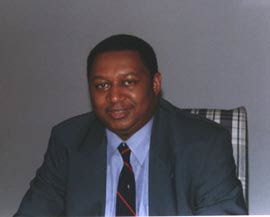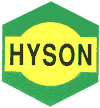
|


Read our exclusive interview
|

 HYSON (NIGERIA) LIMITED (NNPC/VITOL JOINT VENTURE) HYSON (NIGERIA) LIMITED (NNPC/VITOL JOINT VENTURE)
Manager:
Mr. M.S.Barkindo, Managing Director
Contact:
References C & C Towers
7th Floor
Plot 1684 Sanusi Fafunwa Street
Victoria Island
Lagos
Facsimile +234 1 261183 +234 1 2610604
Telephone +234 1 2617736 +234 1 2611403
Telex 21126 HYS NG
|
 Strategy Strategy
Hyson (Nigeria) Limited is a joint venture Company between NNPC and VITOL with 60% and 40% equity share respectively. The Company was established to offer operational and logistics services to the NNPC/VITOL downstream Joint Venture Company "CALSON" whose main objective is to market Nigeria petroleum products and crude oil to the West and Central African sub-region and beyond.
The main functions of HYSON (NIGERIA) LIMITED are to:
Arrange, monitor and documents cargo liftings/discharges.
Advise on vessel nomination, arrival, loading and departure
Manage local payments of pert dues, agency inspection fees, etc.
Provide technical assistance to ensure petroleum products quality and quantity.
Manage oil inventories and scheduling of products lifting.
Handle claims for cargo losses and demurrage and
Carry out any other activities related to petroleum operations and logistics.
 INTERVIEW WITH INTERVIEW WITH
MR BARKINDO,
MD, HYSON (NIG.) LTD.
Marth 10th, 1999.
FORBES: Could you begin by giving us a brief historical background to Hyson and also to yourself?
BARKINDO: Well, Hyson Nigeria Ltd. is one of the subsidiary units, companies, of the NNPC. It is one of the subsidiaries that were created and incorporated in 1988. Before (then) NNPC was one monolithic, corporate structure. In order to keep abreast with developments world wide especially in OPEC member-countries, companies like REBETA, ANAMCO, DECAMERON,… started positioning themselves for the new millenium. NNPC also decided to follow suit and restructure itself first in 1988 to break that monolithic structure into subsidiary companies, and Hyson was one of those companies created. And this was done not just to follow suit because it was felt then that the structure we had could not meet the expectations of the shareholders, (that is) government. Therefore there was need to create specific, business units and give them operational autonomy and financial independence to be able to meet some targets in preparation for full commercialization of their activities and maybe eventual privatization (of) some of them. Eleven of such companies were created; Hyson (Nig) Ltd. was one of them. It was, initially, a Joint Venture with Chevron, an American company. Chevron participation was taken over later by Vitol, which is partly a Dutch company, a worldwide, highly trading and marketing company. So we are in Joint Venture, 60-40%
FORBES: 60% for who?
BARKINDO: 60% to NNPC, 40% to Vitol oil, yes. In order to operate internationally as outlined in our Memorandum of Understanding and Joint Venture agreement, we decided to establish an off-shore company, called Calson Bermuda, a company that is operating now from London. This is to give us a vehicle to operate outside Nigeria, because we are the international arm of operations of the NNPC, we are the opposite number of PPMC, (which) provides the domestic market with products, we trade and market surplus products internationally; we also assist our sister-company PPMC (by) providing them with deficit products, whenever there is a need to do so.
FORBES: Could you tell us more about the products, what products are they exactly?
BARKINDO: Mainly fuel products, because we are also involved in export of fuel oil, LPO, LPFO, we are also involved in export of LFG, as well as all other surplus products, whenever (they are) available. As you can see at the moment, we have been in deficit for quite a number of years how, so we are participating in this to help PPMC in sourcing and supplying those types of products to the domestic market. And we are also involved in the export of crude oil, we market crude oil internationally, through our subsidiaries, Calson Bermuda, operating through Calson Services, U.K., in London.
FORBES: You said you do a lot of business in the United States, could you go into more details of who your partners are over there?
BARKINDO: As Nigeria, yes. As Nigeria, as you might have seen in some of the publications and (in the course of ) the interviews you have had, the United States is the number one destination, number one importer of Nigerian crude oil. On the average we export about 8 to 9 hundred thousand barrels of crude oil per day to the United States, through our joint-venture partners, and through private firms. That, I’ll say, is our biggest market.
FORBES: The Finance Minister told us that he would like to diversify the economy of Nigeria so that it is not so dependant on oil. There is a lot of natural gas in Nigeria. Are you exporting and marketing that as well?
BARKINDO: We have an exclusive contract with PPMC, our domestic subsidiary, to market all surplus LPG (in) the Western European countries. There are several LGN projects going on at the moment. One is the Mobil-NGL, there’s Chevron NGL, they have their own marketing arrangements. The LNG project which is also going into the fast (lane) they also have their own marketing arrangement. But we have been talking to LNG, Nigeria LNG, to see if we can participate in the export of some of the NGLs that may not be part of those financial arrangements.
|
FORBES: when are you going to get an answer on that?
BARKINDO: These are continuing discussions as might already know; we have just signed the FID for (that), and our people from the NNPC have been talking to them on our behalf, that Hyson Nigeria Ltd. is a reliable vehicle they can use to dispose (of) some of these NGLs that are not part of the marketing arrangements that they have with the partners that form the consortium of Nigeria LNG.
FORBES: You also said earlier on that some of the subsidiaries of NNPC were due to be privatized. Is Hyson one of them?
BARKINDO: At the moment, no. Hyson is not one of them. What I was saying was that when this restructuring first took place in 1988, this was one of the objectives … they had short, medium and long-term plans. First of all, they started to create units that are supposed to be financially independent and have some autonomy in terms of operations. Secondly, these units had to be fully commercialized, their operations should be commercialized and they were supposed to be adequately capitalized, in privatization. And these are policy decisions of the government, because they are owned by government, by the Nigerian public. So, in the event of a privatization programme, we would have been in a position to participate in the programme to the benefit of our shareholders and of the Nigerian people.
FORBES: Tell me what your turnover is?
BARKINDO: Of Hyson Nigeria Limited?
FORBES: Yes.
BARKINDO: We are a small, growing company. Our turnover is in the region of 100 million US dollars.
FORBES: It’s so small, isn’t it?
(Laughter)
BARKINDO: It’s a small company, compared to the big guys… But we are growing. The young shall grow.
FORBES: Where do you see Hyson in the next few years, in the next 5 years or something…?
BARKINDO: Our vision is very clear. The objectives of the joint-venture agreement states clearly that Hyson should participate in the export of products, we are now relating to the South African sub-region and Central Africa. But eventually (we’ll go) to all the regions of the world. We are doing our best to see that we meet these objectives, (which) in themselves cannot be accomplished until you have the wherewithall to accomplish them. Like many things in Nigeria in the past few years
(have been happening) Hyson has been going through its ups and downs, targets were not met due to circumstances beyond the control of the company. Now since I came into the company in September of last year, we have been trying to brainstorm, to find out why those conditions existed and how they impacted on the operations of Hyson and how we should overcome them in line with the changing environment. We are going to be very hopeful together with our partners but we will be able to revive this company; potentially strategically, support the operations of our shareholders both NNPC and I … (?)
FORBES: What would you say has been your greatest achievement, your team’s greatest achievement since you’ve been MD Hyson?
BARKINDO: I came in at a time when fuel shortages in this country, had reached very feverish situation, and many of our fuel stations went without fuel for days and weeks; our refineries have been down, this affected both business and the social environment. NNPC, on the other hand, through its subsidiary PPMC, at a point, was not able to meet its financial obligations of paying its importers who import fuel to supply the deficit market. Now, Hyson realizing that we are part of this family, the NNPC Group family, we said to ourselves that we cannot afford to deal with NNPC purely on commercial terms, i.e., you pay, we supply. We realized the cash flow situation they are in. NNPC has never defaulted on its debts. So, we convinced ourselves, and our creditors abroad, and decided to go ahead and supply whatever deficit products the NNPC asked us to supply, okay? At our own risk. ** And I am happy today that we are probably the only company among a host of others who completely refused to supply, and this country was grinding to a halt at a point, but we, as small as we are decided that we have a stake in this country therefor we should go ahead and source for fuel and supply the market so that this country can come back to work again. We are part of NNPC and we cannot afford to see things grinding to a halt and we believe that NNPC cannot default on debts because NNPC is part of the government in this country. We are probably the only company that went ahead to undertake this risky, very highly capital intensive exercise and today we have been commended by our own management that yes, we are a company that they can rely upon at any point in time. If there is need for them to import or export certain products or to supply anything to the system, they are confident that they can call upon us at very short notice. The image of Hyson has changed.
FORBES: As a final question, what would be your message to our 4.5 million readers and potential investors in the US?
BARKINDO: I would like to tell that Nigeria is changing; changing fast, it is changing positively, it is changing for the better. No international, reputable corporation or company that decides to come to Africa can be successful without operating in Nigeria because of the size of the country, the resources of this country. Therefor they should read magazines and read the article in Forbes and come here and spend time. They can read those reports objectively and try and come and see for themselves; not to rely on other third party reports without verifying. Come to Nigeria, spend some time here, see for themselves and see the opportunities.
FORBES: Thank you very much. |
© World INvestment NEws, 1999.
This is the electronic edition of the special country report on Nigeria published in FORBES Magazine,
May 31 st issue.
Developed by AgenciaE.Tv |
|
|
|
|
|
|
|
|
|
|
|

